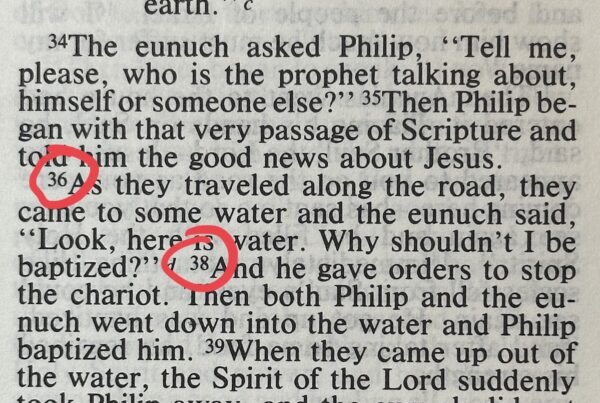One website submission says: “I am currently in a pretty sticky situation with my faith right now. I don’t know if God exists or not, and I don’t want to waste my life on something false if He is not real. I also don’t want to say that I’m an atheist, because I’m not. I’m just lost.”
Here’s a response by Dr. Rich Knopp.
Thanks so much for your willingness to be so candid about your faith struggles right now. It certainly makes sense that you wouldn’t want to invest your life in something that’s false. Your feeling about this is actually pretty close to what Paul the Apostle said in First Corinthians 15. He said, “If Christ has not been raised, then our preaching is in vain and your faith is in vain” (vs. 14) and “If Christ has not been raised, your faith is futile and you are still in your sins” (vs. 17). Paul’s response, however, is to affirm his strong confidence in the truth of the resurrection of Christ, which would never have occurred unless God really exists.
While other considerations may be involved, it sounds like you’re primarily wrestling with uncertainty about God’s existence. Does that mean that you expect to have absolute certainty about God’s existence before you would be willing to commit your life to God? If so, then, in one important sense, you’re setting up an unreasonable—and unattainable—expectation. If you’re talking about what you can know with certainty with your mind and physical senses, then I don’t believe that you will ever have knowledge of God’s existence with absolute certainty. But nobody has that level of intellectual certainty about such ultimate questions. Atheists can never have this level of certainty about God’s non-existence either.
So what’s the alternative, if any? First, the alternative is not to expect or require absolute certainty about God’s existence in terms of what you can intellectually know. Second, the bigger, and better, question is whether you can have sufficient confidence in the existence of God and the core claims about Jesus Christ. Here, I definitely believe that such confidence is both possible and attainable.
Basically, I come at this from two directions: (a) What considerations point to the TRUTH of God and Christianity? and (b) What considerations point to the FALSITY of the alternatives? Regarding point (a), there are many considerations that point to the truth of God and Christianity. I’d especially recommend that you take my “home tour” that briefly explains why I believe in God and Christ.
Regarding point (b), it’s very important to keep in mind that if we are going to reject God and Christianity, then we are necessarily opting for some alternative. A few key questions to ask here are these: (1) How certain can we be that any of these alternatives to God are true? (2) What major weaknesses or problems exist with these alternatives? (3) What are the personal and social consequences if we accept one of these alternatives and consistently live according to it?
Here is where I stress that the alternatives to God and Christianity are much less desirable and less justifiable. In other words, deciding the “God Question” for ourselves is not simply a matter of thinking about some uncertainties about God’s existence; we should honestly and critically compare the alternatives. I believe that when we do this, we can see that the alternatives to God have even greater uncertainty and even greater problems when compared to believing in God, trusting in God, and in following Him faithfully.
Maybe these considerations will help you see that the question of God’s existence is one that can be answered with sufficient confidence even if not with absolute certainty.
But I want to add that there is a sense in which we can have a kind of assurance that goes beyond mere intellectual confidence. I believe that many devoted Christians can properly claim that they have “certainty” of God’s existence. But this kind of certainty is not purely intellectual certainty. It’s an inner level of knowledge that we can have because of God’s very real presence and activity in our own life. This is a kind of knowledge that cannot be fully captured by empirical evidence or philosophical argument. Nonetheless, this kind of personal assurance is possible because God provided his Spirit to dwell within the believer—to provide an internal witness that allows us to know that we are God’s children and that we have an very personal connection to God as our intimate Father. We can call God “Abba,” which is a term that suggests this very close relationship.
I would strongly recommend that you read Romans 8:1-39 and ask God to help you understand and experience the truth presented there.
I’m not promising that your journey will be simple or short. But I believe that God wants to open the door to those who are willing to knock. If you are willing to seek Him, God is willing to allow you to find Him. See Matthew 7:7-8; cf. Luke 11:9-10.
May God bless you as you seek Him sincerely. If you have updates or further questions down the road, please let us know.
–Dr. Rich Knopp, Program Director, Room For Doubt; Professor of Philosophy & Christian Apologetics, Lincoln Christian University.





